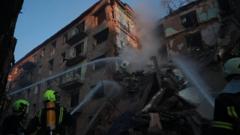**In an atmosphere charged with military confrontation, Israel intensifies its strikes on Iran, raising fears of an expanding conflict involving U.S. forces.**
**Escalating Tensions: Israel Strikes Tehran Amidst U.S. Involvement in Iranian Conflict**

**Escalating Tensions: Israel Strikes Tehran Amidst U.S. Involvement in Iranian Conflict**
**As Israel targets key Iranian sites, international concerns mount over a potential war escalation.**
---
In a significant escalation of hostilities, Israel conducted extensive airstrikes on Tehran, officially targeting a notorious prison and a paramilitary headquarters amid growing tensions in the region. The military campaign coincided with U.S. airstrikes on three key Iranian nuclear facilities, marking a pivotal moment in the ongoing conflict.
Israel's military objectives focused on command centers of the powerful Revolutionary Guards as air raid alarms sounded across Haifa, prompting citizens to seek refuge in shelters. In retaliation, Iran launched missile salvos at Israeli territories, leading to heightened fears of a spiraling conflict.
As the fallout from the strikes remains uncertain, world leaders are urging both parties to de-escalate military actions despite President Trump's assertive stance in support of Israel. American military officials have noticed indications of Iran-related militias preparing to target U.S. bases in Iraq and Syria, heightening anxiety throughout the region.
Simultaneous diplomatic moves occurred, with Iran's foreign minister meeting with Russian President Vladimir Putin, a key ally of Tehran. This meeting followed U.S. airstrikes, the efficacy of which remains disputed; while the U.S. asserts a significant impact on Iran’s nuclear ambitions, senior officials admit clarity on the condition of Iran’s nuclear stockpiles is lacking.
Reports reveal that Israel has damaged critical infrastructure in Tehran, leading to power outages in districts housing over a million residents. The International Atomic Energy Agency (IAEA) convened an emergency meeting in Vienna, where officials warned of escalating violence and called for urgent diplomatic engagement.
In the wake of these developments, the potential economic impact is evident as Asian and European markets exhibit apprehension over the consequences of ongoing hostilities. The Strait of Hormuz, a vital oil transit passage, has become a focal point for geopolitical tensions, with analysts speculating on Iran's next moves.
As military efforts intensify, the prospect of diplomatic solutions fades, with U.S. officials previously suggesting patience for negotiations. The contrast between this stance and recent military actions highlights the precarious balance of power in the region.
Authorities assert that the ongoing strikes represent a collective effort to disrupt Iran's military capabilities in pursuit of preventing them from acquiring a nuclear weapon. The call for negotiations continues to echo from international actors, especially against the backdrop of rising sanctions, threats, and uncertain retaliatory measures from Iran.
In conclusion, the Israeli military's strategic calculations and U.S. involvement in Iranian affairs signal a complex and dangerous phase in Middle Eastern geopolitics. The pathway forward remains fraught with tension amid a climate of uncertainty regarding nuclear ambitions and regional stability.
In a significant escalation of hostilities, Israel conducted extensive airstrikes on Tehran, officially targeting a notorious prison and a paramilitary headquarters amid growing tensions in the region. The military campaign coincided with U.S. airstrikes on three key Iranian nuclear facilities, marking a pivotal moment in the ongoing conflict.
Israel's military objectives focused on command centers of the powerful Revolutionary Guards as air raid alarms sounded across Haifa, prompting citizens to seek refuge in shelters. In retaliation, Iran launched missile salvos at Israeli territories, leading to heightened fears of a spiraling conflict.
As the fallout from the strikes remains uncertain, world leaders are urging both parties to de-escalate military actions despite President Trump's assertive stance in support of Israel. American military officials have noticed indications of Iran-related militias preparing to target U.S. bases in Iraq and Syria, heightening anxiety throughout the region.
Simultaneous diplomatic moves occurred, with Iran's foreign minister meeting with Russian President Vladimir Putin, a key ally of Tehran. This meeting followed U.S. airstrikes, the efficacy of which remains disputed; while the U.S. asserts a significant impact on Iran’s nuclear ambitions, senior officials admit clarity on the condition of Iran’s nuclear stockpiles is lacking.
Reports reveal that Israel has damaged critical infrastructure in Tehran, leading to power outages in districts housing over a million residents. The International Atomic Energy Agency (IAEA) convened an emergency meeting in Vienna, where officials warned of escalating violence and called for urgent diplomatic engagement.
In the wake of these developments, the potential economic impact is evident as Asian and European markets exhibit apprehension over the consequences of ongoing hostilities. The Strait of Hormuz, a vital oil transit passage, has become a focal point for geopolitical tensions, with analysts speculating on Iran's next moves.
As military efforts intensify, the prospect of diplomatic solutions fades, with U.S. officials previously suggesting patience for negotiations. The contrast between this stance and recent military actions highlights the precarious balance of power in the region.
Authorities assert that the ongoing strikes represent a collective effort to disrupt Iran's military capabilities in pursuit of preventing them from acquiring a nuclear weapon. The call for negotiations continues to echo from international actors, especially against the backdrop of rising sanctions, threats, and uncertain retaliatory measures from Iran.
In conclusion, the Israeli military's strategic calculations and U.S. involvement in Iranian affairs signal a complex and dangerous phase in Middle Eastern geopolitics. The pathway forward remains fraught with tension amid a climate of uncertainty regarding nuclear ambitions and regional stability.























